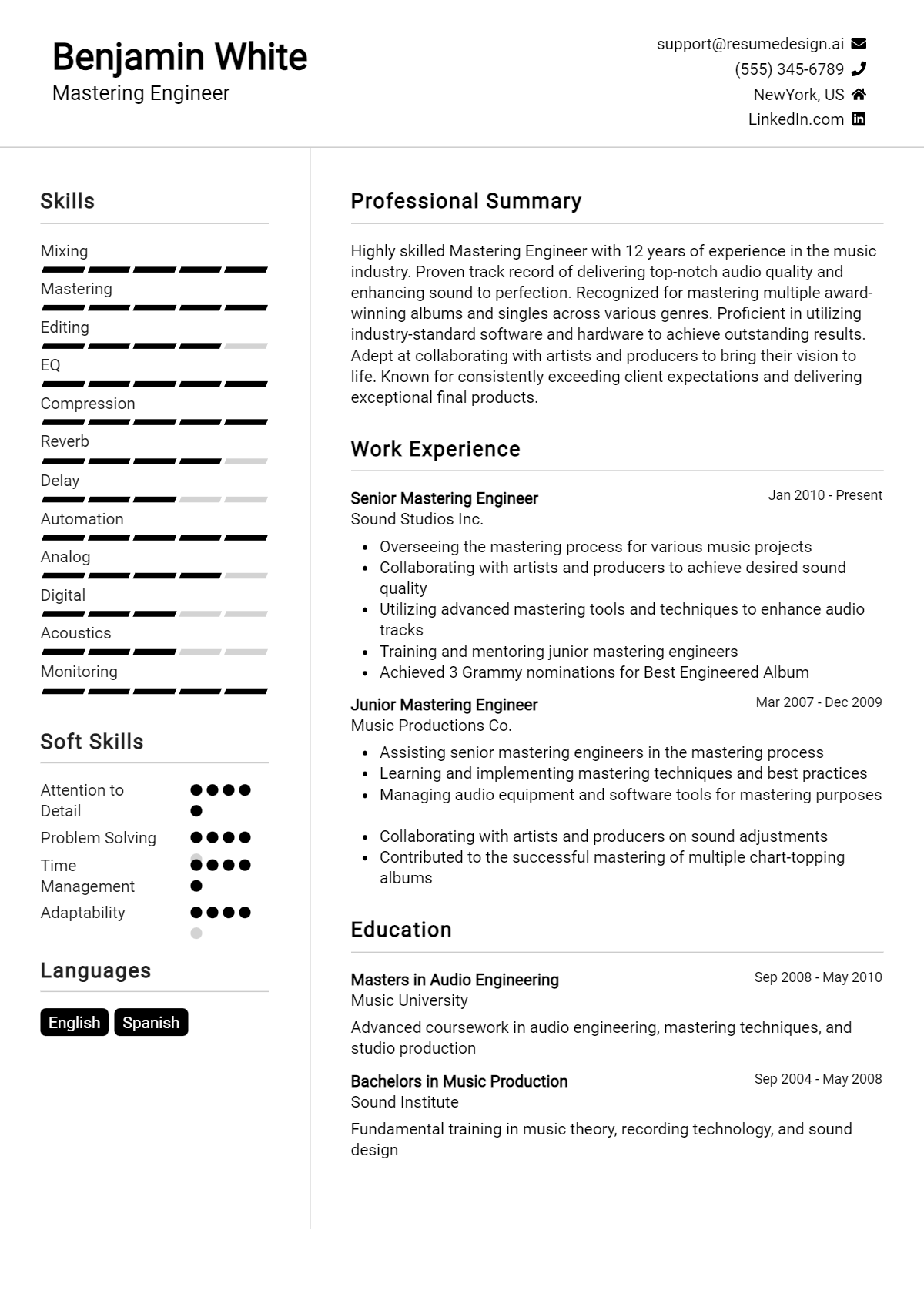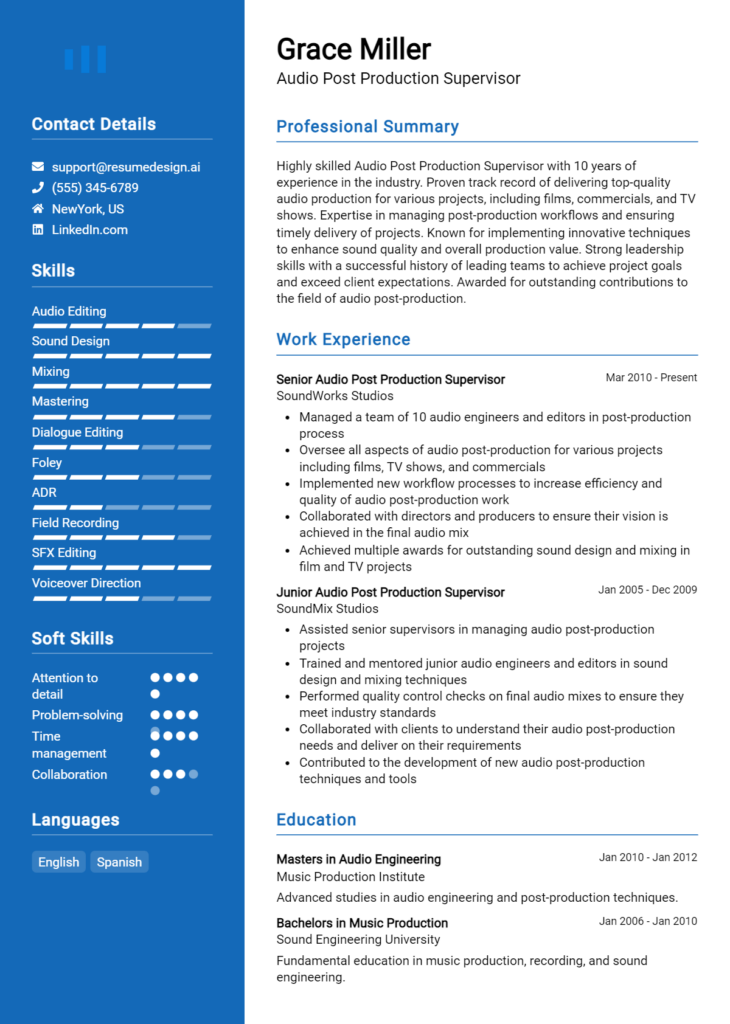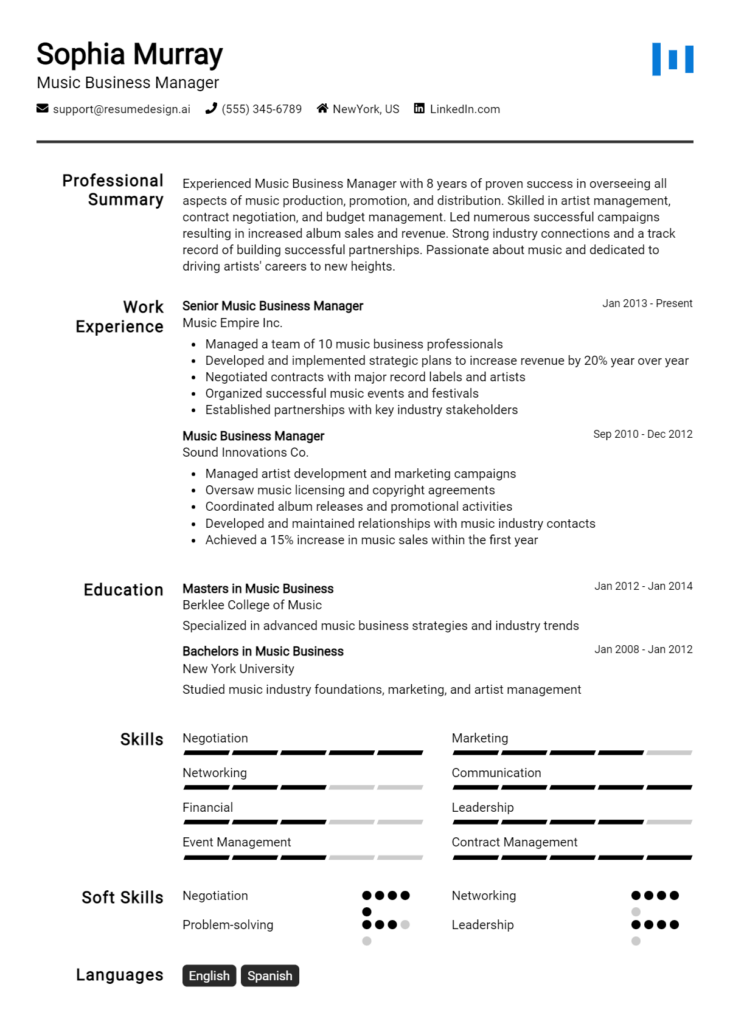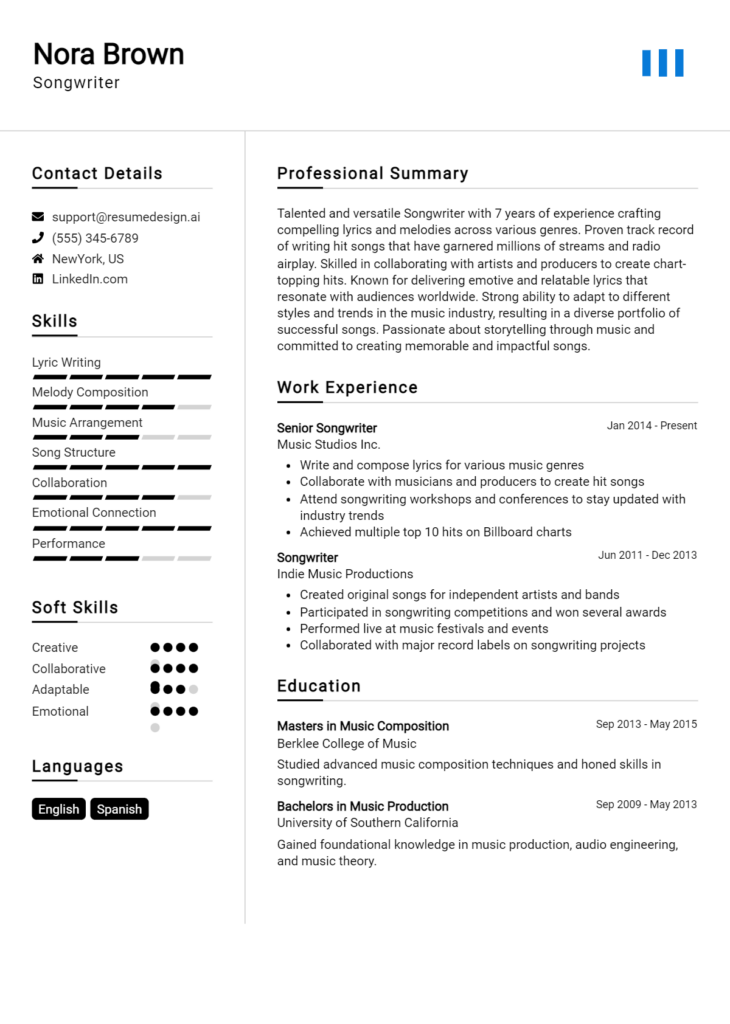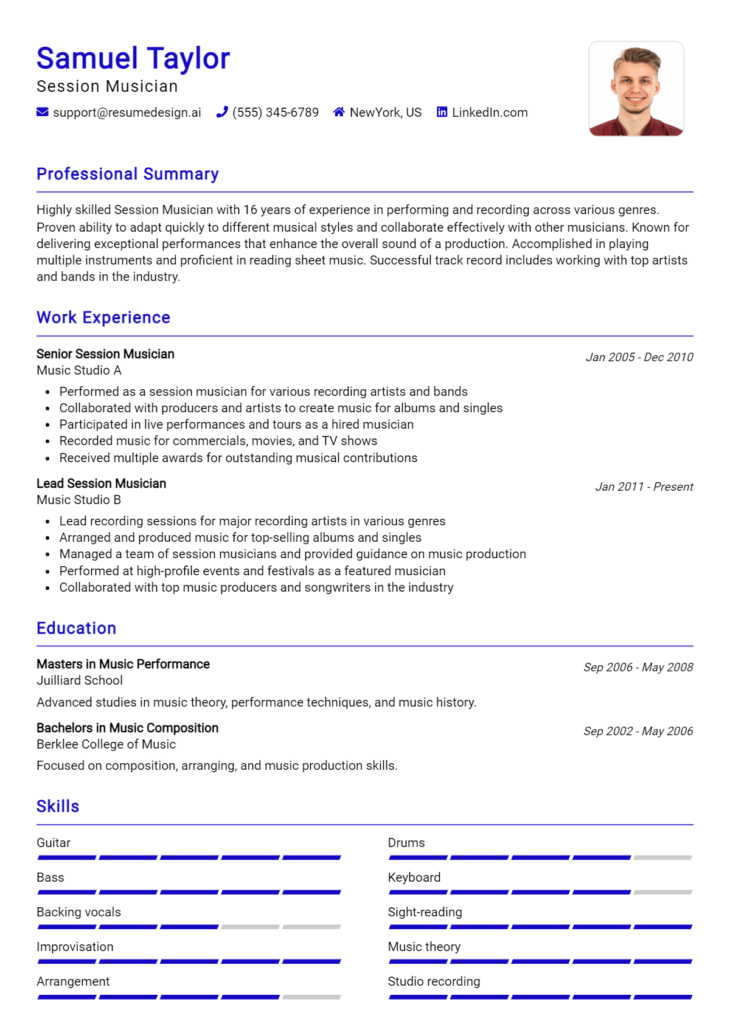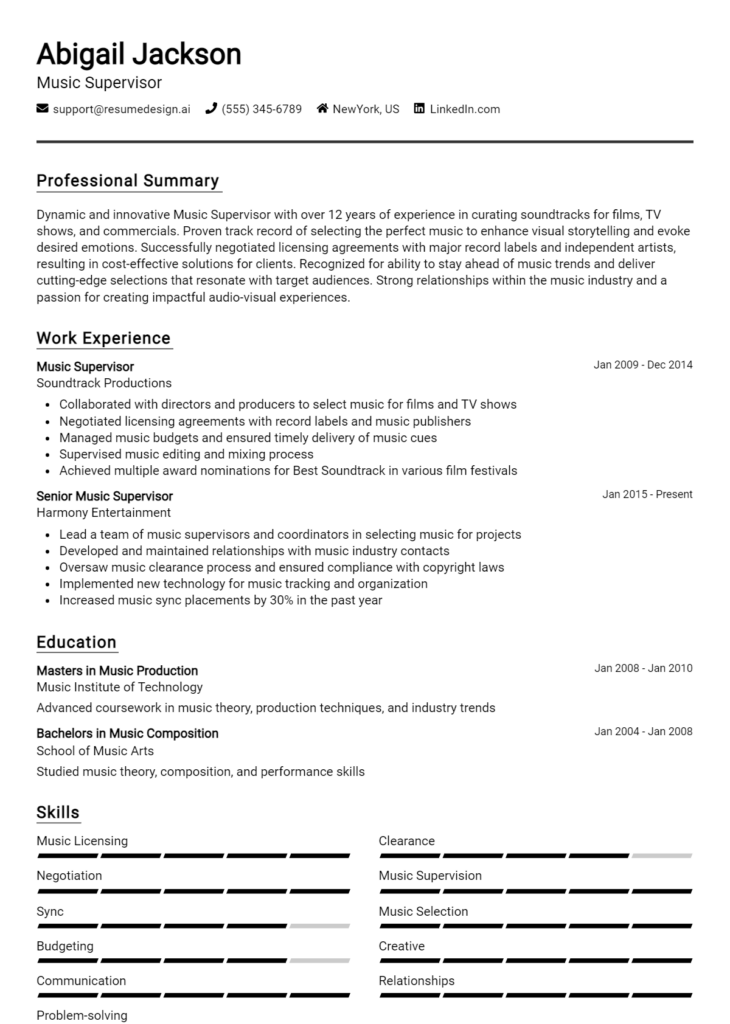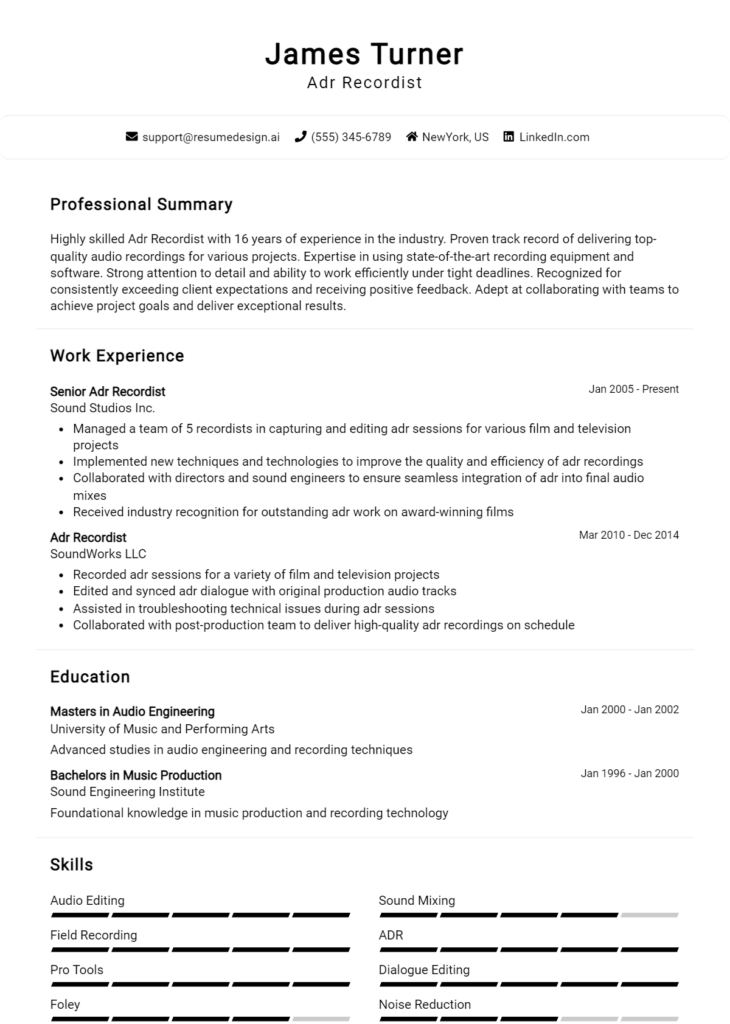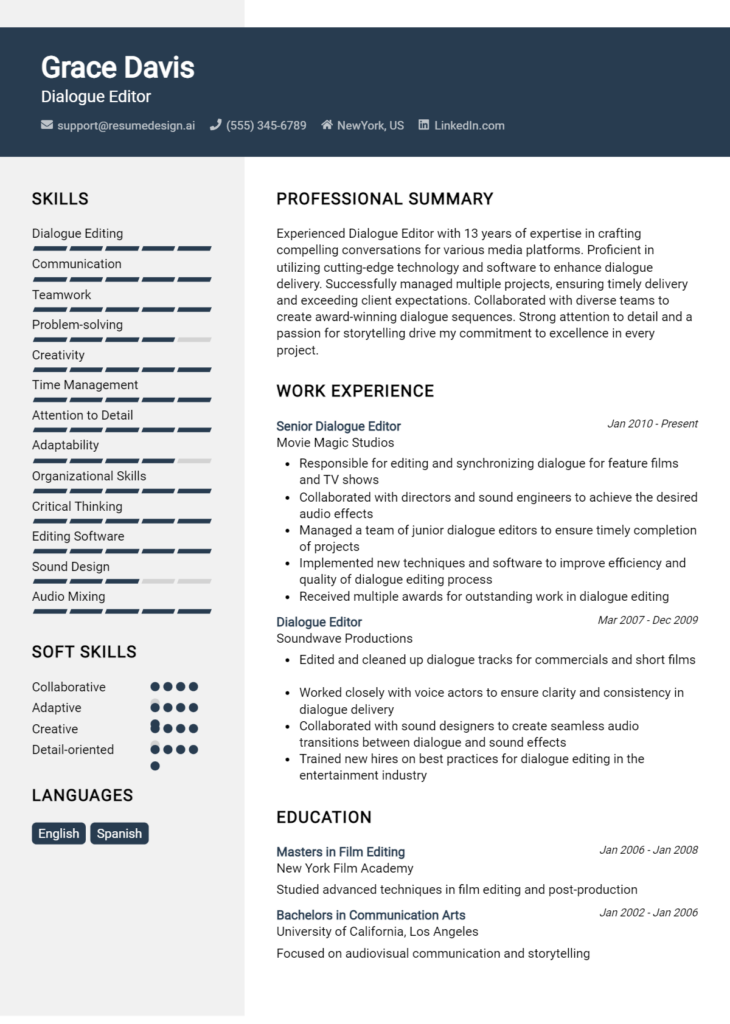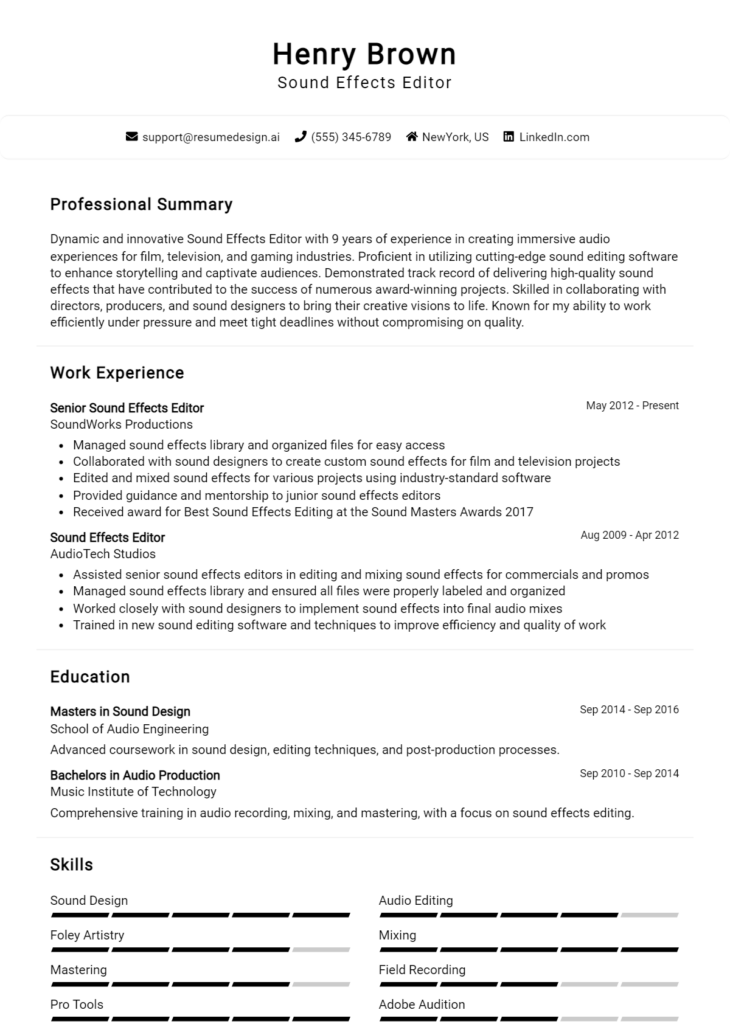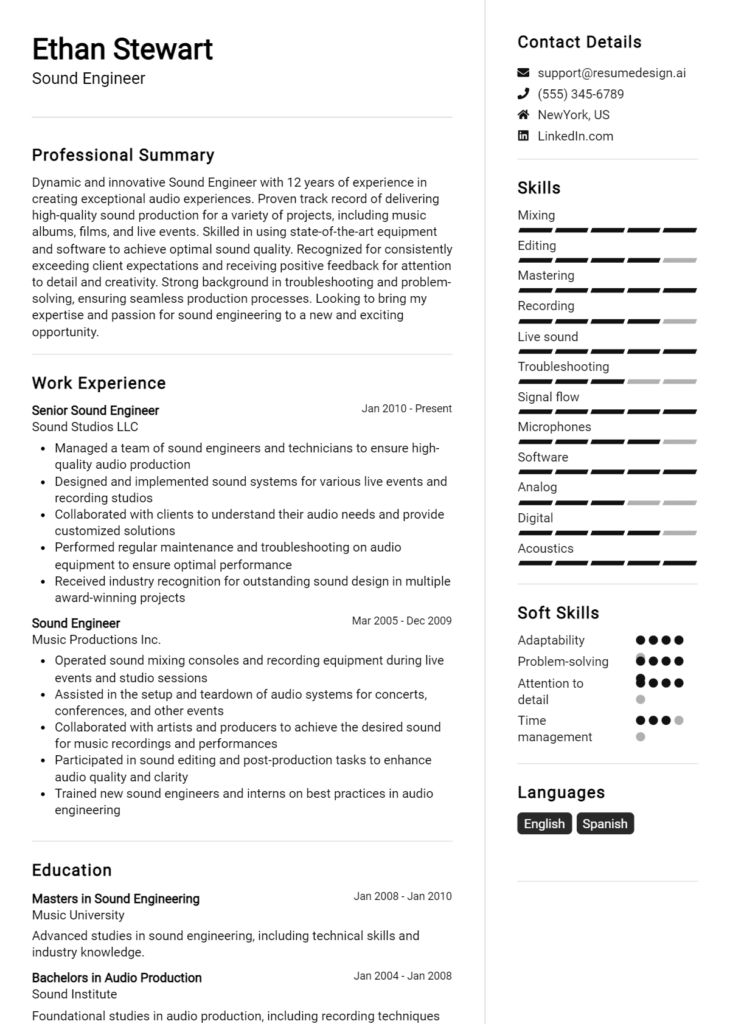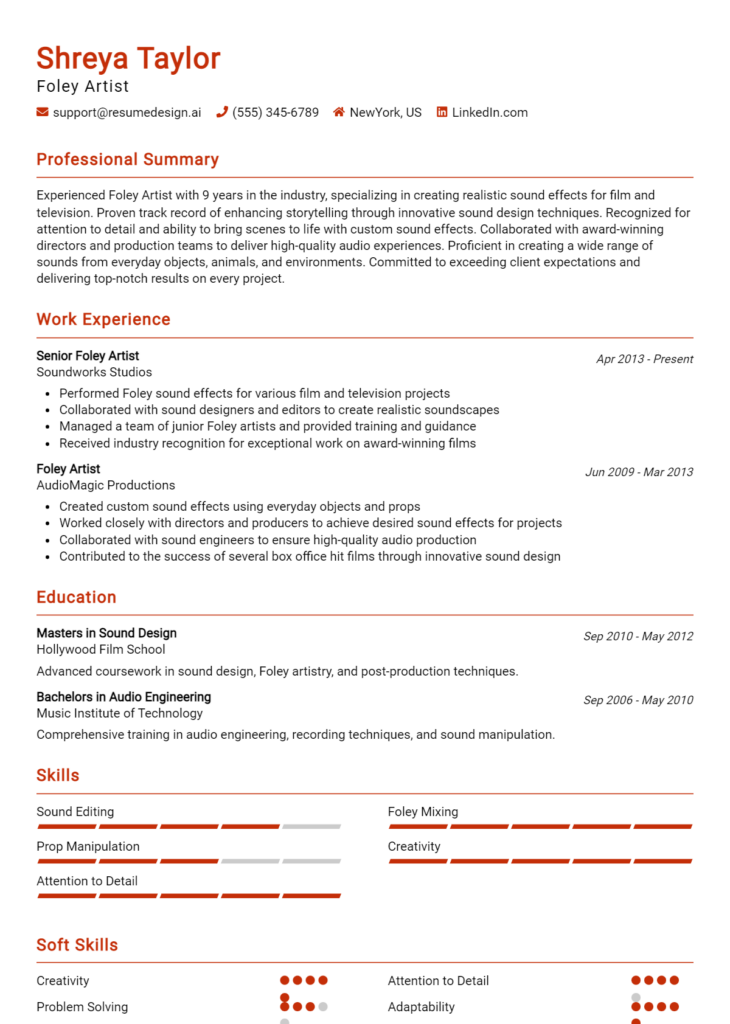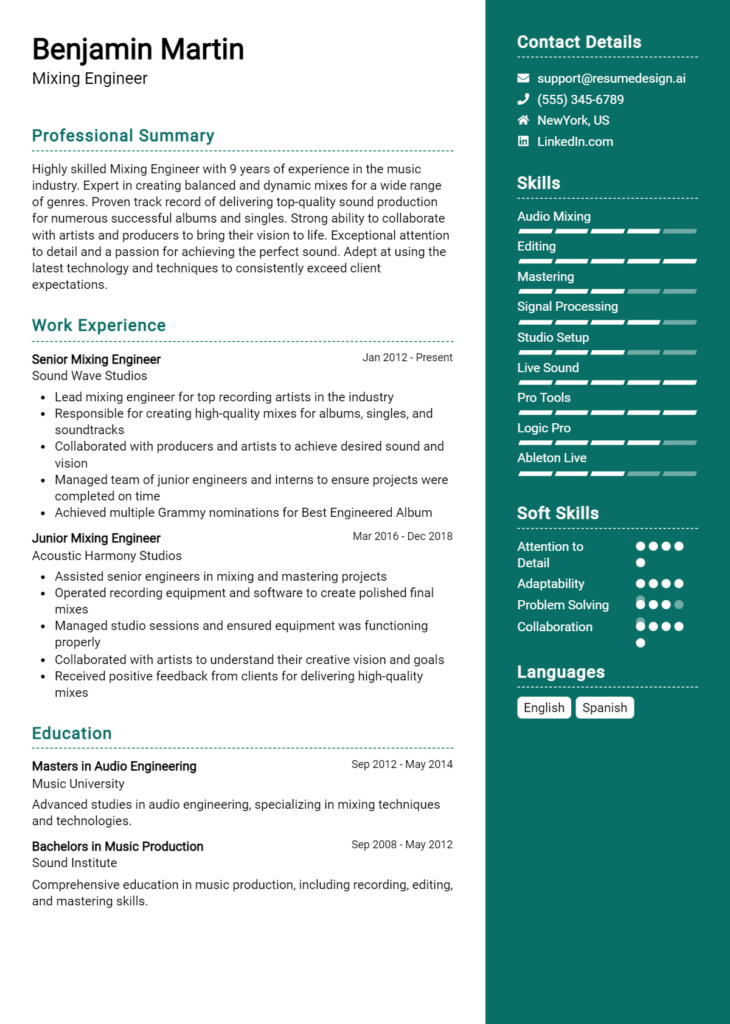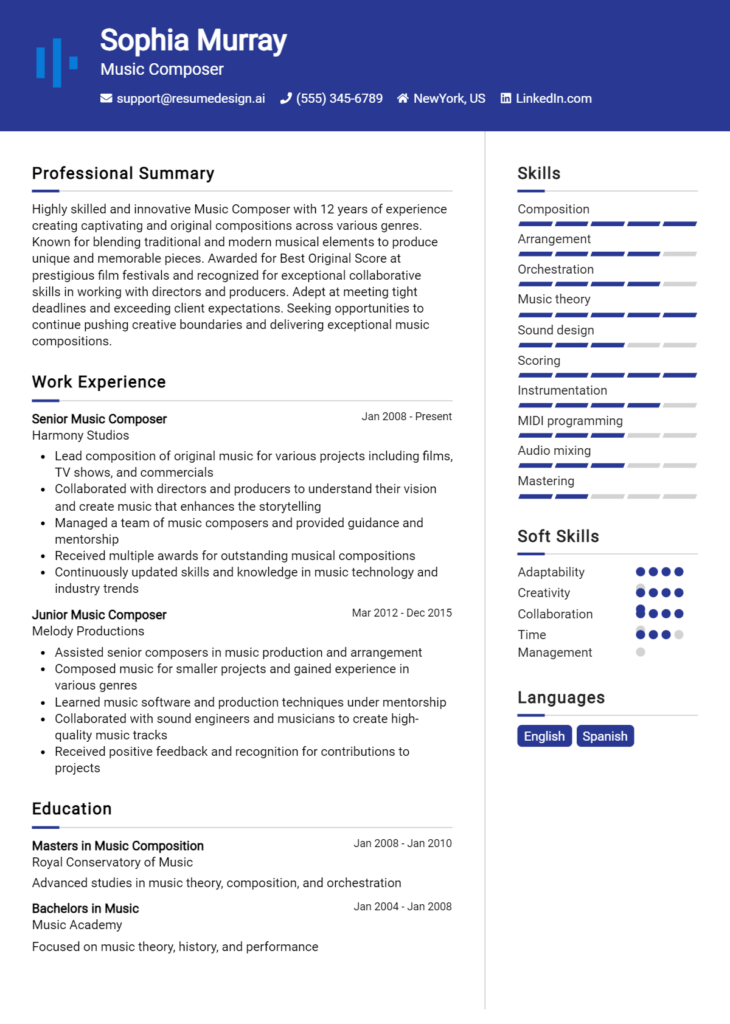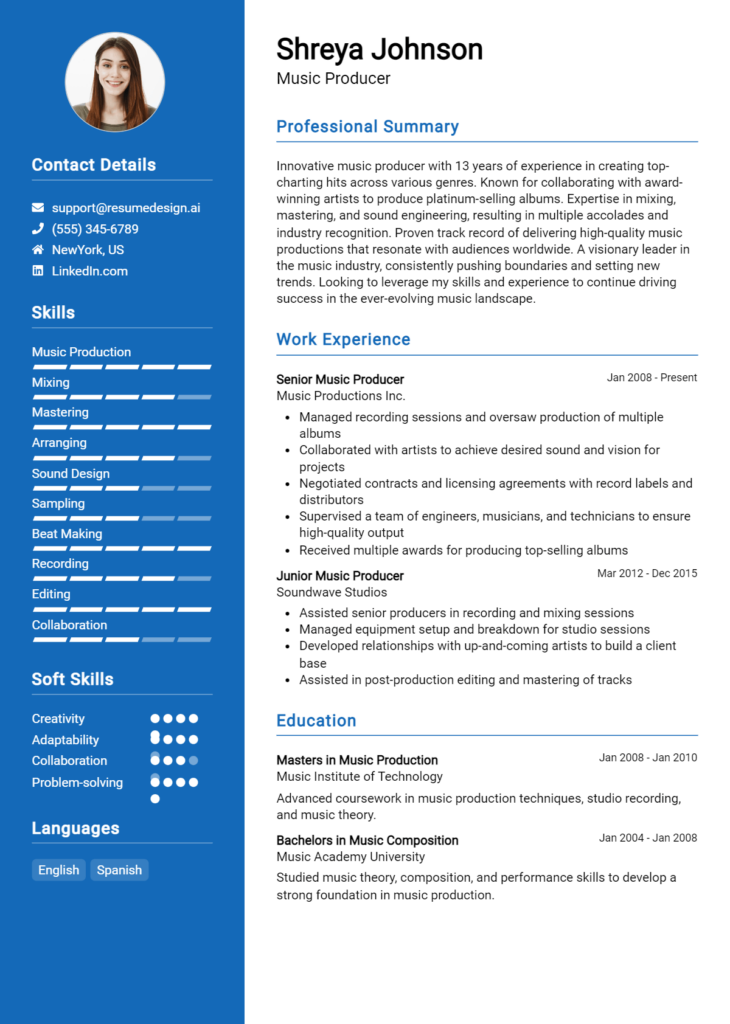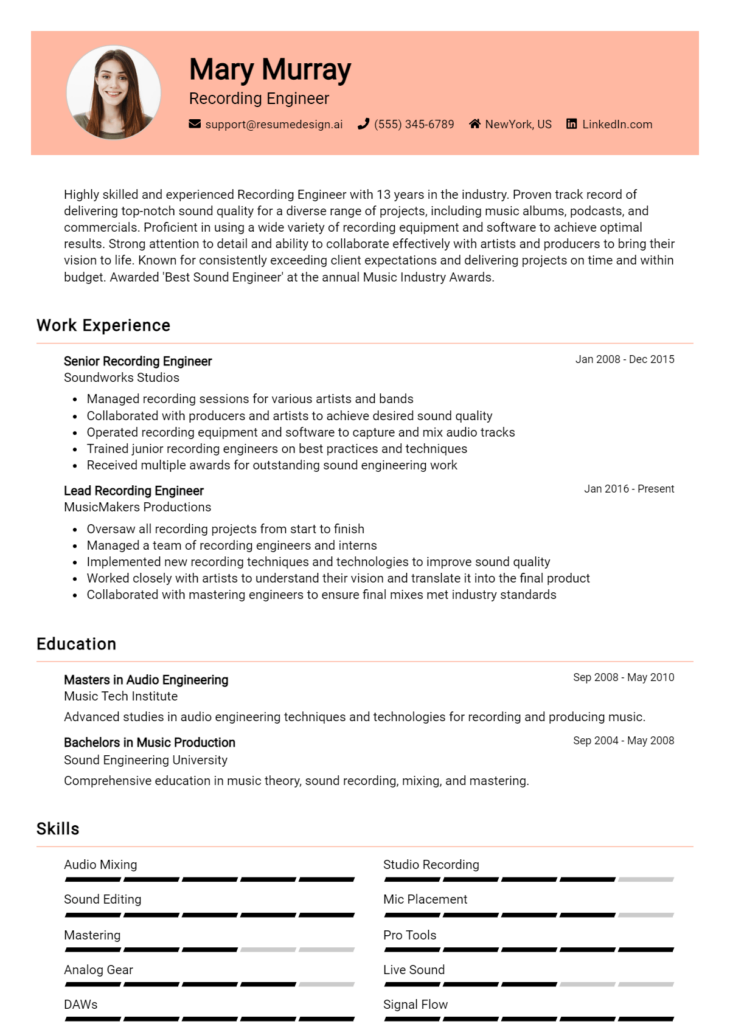Mastering Engineer Core Responsibilities
A Mastering Engineer plays a vital role in the audio production process, ensuring that recordings are polished and ready for distribution. Key responsibilities include enhancing sound quality, sequencing tracks, and preparing final mixes for various formats. This position requires strong technical skills in audio software, operational knowledge of sound engineering principles, and problem-solving abilities to address issues that arise during mastering. By bridging the gap between production and distribution, mastering engineers contribute significantly to the organization's overall goals. A well-structured resume highlighting these qualifications—such as attention to detail, proficiency in audio editing, and effective communication—can make a lasting impression on potential employers.
Common Responsibilities Listed on Mastering Engineer Resume
- Collaborating with producers and artists to achieve desired sound quality
- Using mastering software and hardware to enhance audio tracks
- Preparing audio files for various distribution formats (CD, vinyl, digital)
- Ensuring consistency and balance across tracks in an album
- Identifying and resolving audio issues during the mastering process
- Maintaining high standards of audio fidelity and clarity
- Staying updated with industry trends and mastering techniques
- Communicating effectively with clients and team members
- Creating mastering templates for efficient workflow
- Documenting project details and maintaining organized records
- Performing quality control checks on final audio products
- Adapting to various genres and styles to meet client needs
High-Level Resume Tips for Mastering Engineer Professionals
In the competitive landscape of the audio engineering industry, a well-crafted resume serves as a crucial tool for Mastering Engineer professionals. It is often the first impression candidates make on potential employers, and as such, it must effectively showcase not only their technical skills but also their unique achievements within the field. A resume that reflects a candidate's expertise and accomplishments can set them apart in a crowded job market. This guide aims to provide practical and actionable resume tips specifically tailored for Mastering Engineer professionals, helping them present their best selves to prospective employers.
Top Resume Tips for Mastering Engineer Professionals
- Tailor your resume to each job description, emphasizing the specific skills and experiences that align with the role.
- Start with a strong summary statement that highlights your experience and the value you bring as a Mastering Engineer.
- Showcase relevant experience by detailing your work on various projects, including genres and types of audio you have mastered.
- Quantify your achievements where possible, such as the number of tracks mastered or notable clients you've worked with.
- Highlight industry-specific skills, such as proficiency with mastering software (e.g., Pro Tools, Logic Pro) and knowledge of audio formats.
- Include any relevant certifications or training that demonstrate your commitment to continuous learning in mastering techniques.
- Incorporate testimonials or references from artists, producers, or clients that can vouch for your skills and work ethic.
- Maintain a clean and professional layout that makes it easy for hiring managers to read and navigate your resume.
- Keep your resume concise, ideally one page, focusing on the most relevant information that showcases your expertise.
By implementing these tips, Mastering Engineer professionals can significantly enhance their resumes, making them more appealing to potential employers. A targeted and well-structured resume not only highlights an applicant's qualifications but also communicates their passion and commitment to the craft, ultimately increasing their chances of landing a job in this dynamic field.
Why Resume Headlines & Titles are Important for Mastering Engineer
In the competitive field of audio engineering, particularly for a Mastering Engineer, having a well-crafted resume headline or title is crucial for capturing the attention of hiring managers. A strong headline acts as your first impression, summarizing your key qualifications and unique attributes in a single, impactful phrase. It should be concise and directly related to the job you're applying for, allowing hiring managers to quickly understand your expertise and how you fit into their needs. An effective headline not only stands out in a sea of applications but also sets the tone for the rest of your resume, highlighting your proficiency and experience in mastering audio tracks.
Best Practices for Crafting Resume Headlines for Mastering Engineer
- Keep it concise: Aim for a headline that is brief yet informative.
- Make it role-specific: Tailor the headline to the Mastering Engineer position you are applying for.
- Highlight key strengths: Include your most relevant skills or accomplishments.
- Use impactful language: Choose strong action verbs or adjectives that convey professionalism.
- Avoid jargon: While technical terms can be important, ensure the language is accessible.
- Focus on results: If possible, mention quantifiable achievements that demonstrate your effectiveness.
- Stay relevant: Ensure the headline reflects current industry trends and skills.
- Proofread: Make sure there are no typos or grammatical errors to maintain professionalism.
Example Resume Headlines for Mastering Engineer
Strong Resume Headlines
Accomplished Mastering Engineer with 10+ Years of Experience in High-Quality Audio Production
Award-Winning Mastering Engineer Specializing in Genre-Specific Sound Optimization
Expert Mastering Engineer Known for Elevating Tracks to Commercial Standards
Weak Resume Headlines
Audio Engineer
Mastering Engineer Looking for Work
The strong headlines are effective because they convey specific qualifications, years of experience, and personal achievements that resonate with the hiring managers' criteria. They immediately communicate the candidate's expertise and promise, making them more likely to be remembered. In contrast, the weak headlines lack specificity and do not provide any real insight into the candidate's abilities or accomplishments, failing to differentiate them from other applicants. This vagueness can lead hiring managers to overlook these candidates altogether, as the headlines do not create a compelling narrative or interest.
Writing an Exceptional Mastering Engineer Resume Summary
A well-crafted resume summary is crucial for a Mastering Engineer seeking to make a strong first impression on hiring managers. This brief yet impactful section serves as an introduction to your qualifications, efficiently highlighting key skills, relevant experience, and notable accomplishments that align with the job role. A strong resume summary quickly captures attention, setting the tone for the rest of your application. It should be concise, engaging, and meticulously tailored to the specific job you are applying for, ensuring that you stand out in a competitive field.
Best Practices for Writing a Mastering Engineer Resume Summary
- Keep it concise: Aim for 3-5 sentences that summarize your qualifications.
- Quantify achievements: Use numbers to demonstrate your impact, such as "increased sound quality by 30%."
- Highlight relevant skills: Focus on skills that are directly related to the mastering engineer role, such as proficiency in specific software or techniques.
- Tailor to the job description: Customize your summary to reflect the language and requirements of the job posting.
- Showcase your experience: Mention years of experience or notable projects that align with the position.
- Use action verbs: Start sentences with dynamic verbs to create a sense of accomplishment.
- Reflect your passion: Convey enthusiasm for audio engineering and mastering, as this can resonate with potential employers.
Example Mastering Engineer Resume Summaries
Strong Resume Summaries
Results-driven Mastering Engineer with over 8 years of experience in audio production, specializing in high-fidelity sound optimization. Successfully mastered over 150 albums, achieving a 25% reduction in noise levels and enhancing overall audio clarity, leading to increased artist satisfaction.
Detail-oriented Mastering Engineer with a robust background in digital audio processing and mastering techniques. Proven track record of collaborating with top-tier artists and producers, resulting in 10 Billboard-charting albums in the past 5 years.
Creative Mastering Engineer skilled in both analog and digital formats, with expertise in advanced EQ and compression techniques. Instrumental in improving audio tracks for a major streaming service, resulting in a 40% increase in user engagement and retention.
Weak Resume Summaries
I am a Mastering Engineer with experience in audio work. I enjoy working with music and have completed several projects.
Mastering Engineer looking for opportunities. I have some skills in audio engineering and like to work on different types of music.
The strong resume summaries are considered effective because they are specific, include quantifiable achievements, and directly relate to the responsibilities of a Mastering Engineer. They showcase the candidate's experience and provide a clear picture of their impact in previous roles. In contrast, the weak summaries lack detail, fail to highlight specific accomplishments, and come across as generic, making it difficult for hiring managers to assess the candidate's qualifications and potential contributions to their team.
Work Experience Section for Mastering Engineer Resume
The work experience section of a Mastering Engineer resume is crucial as it serves as a testament to the candidate's technical acumen and their ability to deliver high-quality audio products. This section not only highlights the specific skills and techniques mastered throughout their career but also demonstrates the candidate’s capacity to manage teams effectively and collaborate with various stakeholders in the production process. By quantifying achievements and aligning their experience with industry standards, candidates can present a compelling narrative that showcases their contributions and the value they can bring to potential employers.
Best Practices for Mastering Engineer Work Experience
- Focus on quantifiable achievements, such as the number of projects completed or percentage improvements in sound quality.
- Highlight specific mastering techniques and software proficiency that are relevant to the job description.
- Emphasize collaboration with artists, producers, and other engineers to demonstrate teamwork and communication skills.
- Include industry-standard terminology to align your experience with the expectations of hiring managers.
- Detail leadership roles in projects, showcasing your ability to manage and mentor team members.
- Showcase awards or recognition received for your work, emphasizing credibility and expertise.
- Use action verbs to convey a sense of initiative and impact in your roles.
- Keep the experiences relevant to the position you are applying for and tailor your descriptions accordingly.
Example Work Experiences for Mastering Engineer
Strong Experiences
- Successfully mastered over 150 tracks for various artists, resulting in a 30% increase in digital sales for the associated albums.
- Led a team of 5 engineers on a groundbreaking project that introduced new audio processing techniques, earning a nomination for a Grammy award.
- Implemented a new quality control process that reduced mastering errors by 40%, significantly improving client satisfaction and repeat business.
- Collaborated with top producers and musicians to deliver high-fidelity audio for major label releases, contributing to a 20% growth in studio bookings.
Weak Experiences
- Worked on various audio projects without specifying roles or outcomes.
- Assisted in mastering sessions, but did not outline specific contributions or results.
- Participated in team meetings and discussions without clarifying how this impacted project success.
- Gained experience in audio engineering without detailing any particular skills or technologies used.
The examples provided illustrate the distinction between strong and weak work experiences. Strong experiences are characterized by specific, quantifiable outcomes that demonstrate the candidate's impact and technical expertise, while weak experiences lack detail and do not convey a clear sense of contribution or achievement. By focusing on measurable results and relevant skills, candidates can effectively communicate their value to potential employers.
Education and Certifications Section for Mastering Engineer Resume
The education and certifications section of a Mastering Engineer resume is crucial for demonstrating the candidate's academic foundation and expertise in audio engineering. This section not only showcases relevant degrees and industry-recognized certifications but also reflects a commitment to continuous learning and professional development. By including pertinent coursework, specialized training, and certifications, candidates can enhance their credibility and better align themselves with the specific requirements of the job role, thereby standing out in a competitive field.
Best Practices for Mastering Engineer Education and Certifications
- Prioritize relevant degrees such as a Bachelor's or Master's in Audio Engineering, Music Production, or a related field.
- Include industry-recognized certifications from reputable organizations, such as Avid Pro Tools or Dolby Atmos certifications.
- Detail any specialized training programs that focus on mastering techniques, audio restoration, or sound design.
- List applicable coursework that enhances your qualifications, such as Advanced Mixing Techniques or Digital Audio Workstations.
- Keep the section concise by focusing on the most relevant education and certifications.
- Use clear formatting to make this information easy to read and navigate.
- Highlight any ongoing education efforts, such as workshops or online courses, to show commitment to staying current in the field.
- Consider the order of entries; list the most relevant and recent qualifications first.
Example Education and Certifications for Mastering Engineer
Strong Examples
- Bachelor of Science in Audio Engineering, Berklee College of Music, 2020
- Certified Pro Tools Operator, Avid Technology, 2021
- Advanced Mastering Techniques Workshop, SAE Institute, 2022
- Certificate in Music Production, Full Sail University, 2019
Weak Examples
- Associate Degree in General Studies, Local Community College, 2015
- Certification in Basic Computer Skills, Online Course, 2020
- High School Diploma, Anytown High School, 2012
- Outdated Certification in Basic Sound Editing, 2010
The examples labeled as strong demonstrate a clear alignment with the Mastering Engineer role, showcasing relevant degrees and certifications that are recognized in the industry. They reflect a focused educational background and ongoing professional development that are essential for success in audio mastering. In contrast, the weak examples highlight irrelevant qualifications or outdated certifications that do not contribute to the candidate's credibility in the field, thereby diminishing their appeal to potential employers.
Top Skills & Keywords for Mastering Engineer Resume
In the competitive field of audio engineering, a well-crafted resume for a Mastering Engineer should highlight a range of essential skills that not only showcase technical proficiency but also demonstrate interpersonal capabilities. The right combination of hard and soft skills can set a candidate apart from others in the industry. Hard skills reflect the technical expertise required for the role, while soft skills indicate how well an engineer can collaborate with others and adapt to different situations. Including these skills effectively can make a significant impact on hiring managers, enhancing the chances of landing an interview. For a comprehensive overview of essential skills, consider checking out this resource on skills.
Top Hard & Soft Skills for Mastering Engineer
Soft Skills
- Attention to Detail
- Communication Skills
- Problem-Solving Abilities
- Team Collaboration
- Time Management
- Creativity
- Adaptability
- Patience
- Critical Thinking
- Client Relations
Hard Skills
- Mastering Software Proficiency (e.g., Pro Tools, Logic Pro)
- Audio Restoration Techniques
- EQ and Compression Techniques
- Knowledge of Different Audio Formats
- Mixing and Mastering Techniques
- Understanding of Loudness Standards
- Experience with Analog and Digital Equipment
- Audio Signal Flow Knowledge
- Technical Troubleshooting
- Familiarity with Metadata and Track Sequencing
By integrating both hard and soft skills into a Mastering Engineer resume, candidates can effectively showcase their qualifications and readiness for the dynamic challenges of the audio industry. Additionally, detailing relevant work experience will further strengthen their application.
Stand Out with a Winning Mastering Engineer Cover Letter
Dear [Hiring Manager's Name],
I am writing to express my interest in the Mastering Engineer position at [Company Name], as advertised on [where you found the job posting]. With over [X years] of experience in audio mastering and a deep passion for music production, I am excited about the opportunity to contribute to your team. My background in both technical and creative aspects of sound engineering, coupled with my commitment to delivering high-quality audio, positions me as a strong candidate for this role.
Throughout my career, I have had the privilege of working with a diverse range of artists and genres, from indie rock to electronic music. My proficiency with industry-standard software and hardware, including [specific tools/software you are experienced with], has allowed me to create polished, professional-sounding masters that resonate with listeners. I pride myself on my meticulous attention to detail, ensuring that every track I master is tailored to the artist's vision and the intended listening environment. Additionally, my collaborative approach fosters strong relationships with artists and producers, resulting in a smooth workflow and satisfying outcomes.
At [Previous Company/Project], I successfully mastered over [X number] of tracks, which received positive feedback from both clients and audiences. My dedication to staying current with industry trends and technology enables me to provide innovative solutions that enhance the final product. I am particularly drawn to [Company Name] because of its commitment to pushing creative boundaries and its reputation for excellence in the music industry. I am eager to bring my skills and passion for sound to your esteemed company and help artists achieve their sonic goals.
Thank you for considering my application. I look forward to the possibility of discussing how my experience and vision align with the goals of [Company Name]. I am excited about the opportunity to contribute to your projects and help elevate the artistry of the musicians you work with.
Sincerely,
[Your Name]
[Your Contact Information]
Common Mistakes to Avoid in a Mastering Engineer Resume
When crafting a resume for a mastering engineer position, it's crucial to present your skills and experience effectively. Many applicants make common mistakes that can undermine their chances of securing an interview. By avoiding these pitfalls, you can create a more compelling resume that highlights your expertise and professionalism in the audio engineering field.
Neglecting to Tailor the Resume: Failing to customize your resume for each job application can make it seem generic. Highlight specific skills and experiences that align with the job description.
Overlooking Technical Skills: Not listing essential technical skills, such as proficiency in mastering software (e.g., Pro Tools, Logic Pro) and hardware, can leave potential employers questioning your qualifications.
Using Vague Language: Avoid using ambiguous terms or jargon that may not clearly convey your capabilities. Be specific about your achievements and the techniques you employed.
Inadequate Experience Descriptions: Simply listing previous jobs without elaborating on your responsibilities or accomplishments can make your experience seem less impactful. Use quantifiable results to demonstrate your contributions.
Ignoring the Importance of Sound Design Knowledge: Omitting your understanding of sound design principles can be a missed opportunity to showcase your well-rounded skill set. Include relevant knowledge about acoustics and audio theory.
Failing to Highlight Collaboration Skills: Mastering engineers often work closely with artists and producers. Not emphasizing your teamwork and communication skills can give the impression that you may not fit well in a collaborative environment.
Poor Formatting and Clarity: A cluttered or disorganized resume can detract from your qualifications. Ensure your resume is visually appealing, easy to read, and well-structured.
Not Including a Portfolio Link: Failing to provide a link to your portfolio or samples of your work can result in missed opportunities to showcase your mastery of the craft. Always include relevant links to your completed projects.
Conclusion
As a Mastering Engineer, your role is pivotal in the music production process, ensuring that tracks sound polished and professional. Throughout this article, we’ve covered essential skills and qualifications that every Mastering Engineer should showcase in their resume, including technical proficiency in audio software, a keen ear for detail, and the ability to work collaboratively with artists and producers. We’ve also highlighted the importance of a strong portfolio that demonstrates your previous work and achievements in the industry.
To stand out in this competitive field, it’s crucial to present a well-structured and visually appealing resume. Take the time to review and enhance your Mastering Engineer resume, ensuring it reflects your unique skills and experiences effectively.
To assist you in this process, consider utilizing the various resources available, such as resume templates, which can provide a professional look. You might also explore our resume builder for a user-friendly way to create and customize your resume. For inspiration, browse through resume examples that showcase successful Mastering Engineers. Additionally, don't overlook the importance of a compelling introduction; our cover letter templates can help you craft a letter that complements your resume.
Now is the time to take action—revamp your resume with these tools and position yourself for success in your career as a Mastering Engineer!

